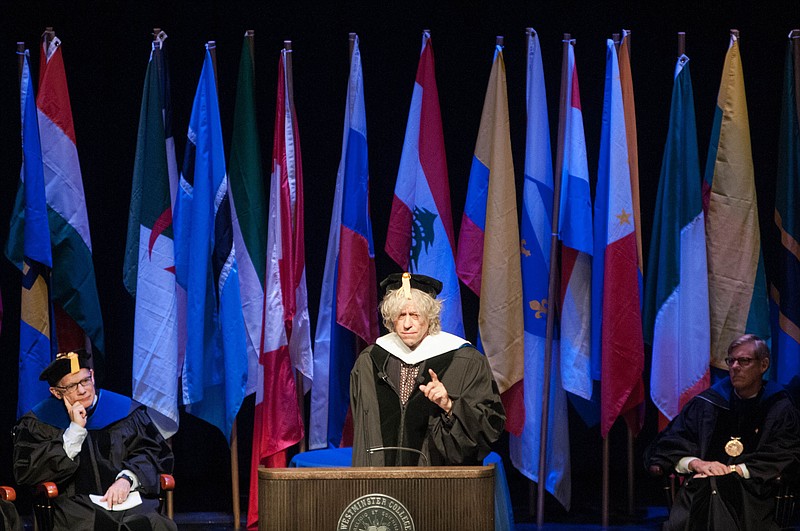Westminster College President Barney Forsythe greeted students, faculty and community members with the same catch phrase as usual, "It's a great day to be a Blue Jay."
The mood was jubilant as Champ Auditorium on campus was packed for the Green Foundation Lecture on the final day of the annual Hancock Symposium.
Amidst the rousing introductions and cheers, Forsythe reminded the weight of the presentation to come. The Hancock Symposium is a time to come together for a love of learning while offering conflicting viewpoints about "matters of global importance," Forsythe told the crowd Wednesday afternoon.
The festive mood continued as Forsythe introduced his friend, former classmate, board of trustees member and former chairman and CEO of MTV William Roedy. Roedy was also eager to give complimentary accolades of a friend as he was tasked to introduce the featured speaker, Sir Bob Geldof. After receiving an honorary doctorate of music from Westminster, and a few ice-breaker jokes, Geldof was quick to delve into a bleak view of the United States and world.
"We're going to talk about desperate things and serious times," Geldof told the crowd.
He spoke of his rough childhood and journey to find himself leading the Live Aid concert - one of the largest television broadcasts of all time to raise money for starving people in Africa in a time (1985) years before traditional Westminster students were born. That effort collected enough money that his organization has spent $10,000 per day for nearly 30 years helping the "poorest of the poor."
Geldof said the money was good for the cause, but it only mends a problem and does not fix the bigger issue. His message for about an hour and a half repeatedly returned to saying systemic problems persist and fixing those will cure the recurring disease of poverty and hunger.
Geldof said politics is numbers and charity is empathy.
"To see pain, to see hurt, and refuse (to help) - then I tell you this: something inside us will wither and die," Geldof said.
He went on to further define terms he used repeatedly in his presentation, saying art mediates emotions while power and politics mediate events. He said politics are made from economics. Geldof said the world's economy has changed, but politics have not changed accordingly - which is why politicians in the United States and elsewhere are stuck in gridlock, leaving everyone else to suffer.
"We live in a world where 20 percent of the planet absorbs 80 percent of its goods," Geldof said. "You can't do that. We have nowhere to go, it's a little rock."
He said the current system is unfit for the 21st century. Cell phones and the Internet have changed economy, communication and art. Geldof said that as much as his fundraising has done for nations in Africa, technology has boosted the economy the most. Without adequate transportation between cities, commerce was isolated; with cell phones and better communication new avenues have developed in commerce. He noted that seven of the 10 fastest-growing economies in the world are in Africa.
Geldof also talked about technology's role in art and art's role in politics. He said an artist stands on the margin and reports back from the edge.
"What is marginal today will be central tomorrow," Geldof said.
He noted artists reflecting society will often show what society is thinking before it realizes it.
However, he noted art and political ambition are incompatible - if an artist has that political ambition he or she should be an activist. That's the role he switched to - the popular 1984 song "Do They Know It's Christmas," by Geldof's band at the time was not written and recorded for artistic reasons, he said, but to create awareness of the dire situation in Africa.
Geldof pointed out the use of technology to spread art that reflects society has been done for centuries. He cited Charles Dickens, who affected social change by using the technology of the time: he serialized his novels in magazines. In Geldof's youth, the radio spread music - particularly rock-and-roll - that inspired. Later, satellites made his Live Aid concerts possible. He went on to point out the role the Internet can play.
"There will be a Sistine Chapel of the web," Geldof said.
And he took it further.
"Today, folk art is made on your smart phone," Geldof said.
Tying it back to the theme of the symposium, taking from The Beatles lyrics, "So, You Say You Want a Revolution," Geldof said the revolution lies in the people today.
"The future may not be ours, but our values must shape it," Geldof said to close his speech.

